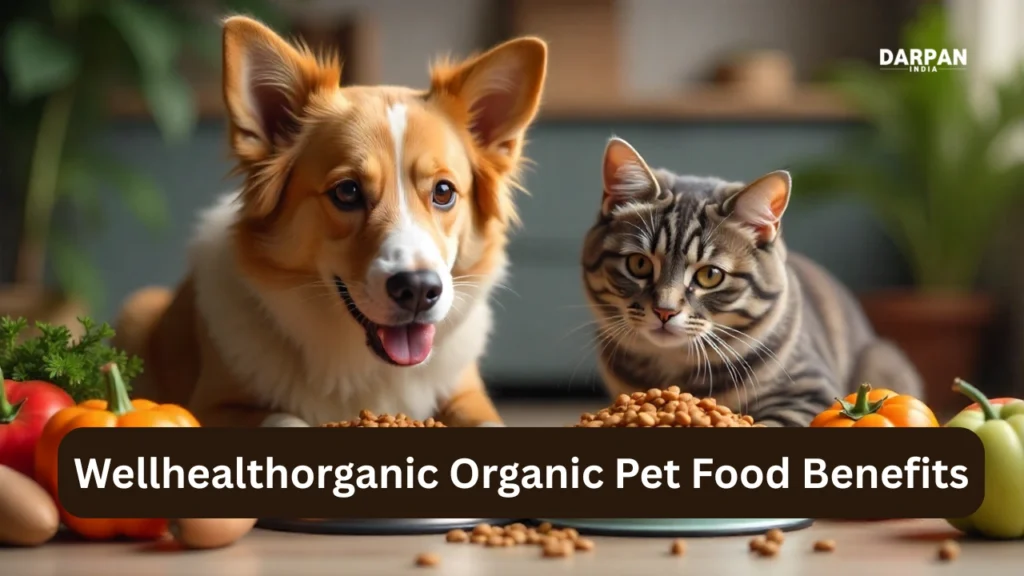Pets are more than just animals—they are family. Ensuring they stay healthy and active is a priority for every pet parent. One of the most effective ways to promote their overall well-being is by feeding them quality food. Wellhealthorganic Organic Pet Food Benefits are becoming increasingly popular because they provide natural nutrition without harmful chemicals, preservatives, or fillers. By choosing organic options, you are giving your pets a diet closer to nature, which supports their health in numerous ways. This blog will explore why switching to Wellhealthorganic organic pet food can make a huge difference in your pet’s life and why it’s a smart choice for responsible pet owners.
What Makes Wellhealthorganic Organic Pet Food Stand Out
Not all pet foods are created equal. The difference lies in the ingredients and how they are sourced. Wellhealthorganic Organic Pet Food Benefits start with the commitment to provide 100% organic ingredients. These foods are free from synthetic pesticides, artificial colors, and flavor enhancers, which can harm your pet in the long run.
Organic pet foods like Wellhealthorganic prioritize natural nutrition, meaning every ingredient serves a purpose. High-quality protein sources such as organic chicken, fish, or plant-based proteins help strengthen muscles and maintain a healthy weight. Essential vitamins and minerals are preserved naturally, supporting your pet’s immune system, digestion, and overall vitality.
Key Ingredients in Wellhealthorganic Organic Pet Food
- Organic meats like chicken, beef, and fish
- Whole grains such as brown rice and oats
- Organic vegetables and fruits for antioxidants
- Essential fatty acids from flaxseed and fish oil
- Natural probiotics for digestive health
These ingredients are carefully selected to provide balanced nutrition without unnecessary fillers or chemicals.
Also Read
Health Benefits of Feeding Your Pet Organic Food

The health benefits of organic pet food go far beyond basic nutrition. Pets are sensitive to chemicals and additives, which can cause allergies, digestive issues, and chronic health problems over time. By choosing organic, you’re reducing these risks significantly. Wellhealthorganic Organic Pet Food Benefits include better digestion, improved skin and coat, enhanced immunity, and sustained energy levels throughout the day.
One of the most notable benefits is the improvement in digestive health. Organic pet foods contain natural fibers and probiotics that help regulate bowel movements and reduce gastrointestinal issues. Pets prone to allergies or skin problems also respond well to organic diets because these foods lack artificial dyes and preservatives. Additionally, organic diets often contain omega-3 and omega-6 fatty acids, which are essential for joint health, brain development, and cardiovascular function.
Feeding your pet organic food is also an investment in their long-term well-being. Healthier pets are less likely to develop chronic illnesses, which can save you on medical expenses. By switching to Wellhealthorganic, you’re giving your pet a clean, wholesome diet that supports a happier and healthier life.
Top Health Benefits at a Glance
- Better digestion and reduced gastrointestinal issues
- Shiny, healthy coat and improved skin health
- Stronger immunity and disease resistance
- Increased energy and vitality
- Reduced risk of food-related allergies and sensitivities
Why Organic Pet Food Is Worth the Investment

Some pet owners hesitate to switch to organic due to the slightly higher cost, but the long-term benefits make it worthwhile. The quality of ingredients and careful manufacturing processes ensure that your pet is receiving maximum nutrition. With conventional pet foods, cheap fillers and additives can lead to health issues that end up costing more in veterinary bills.
Wellhealthorganic Organic Pet Food Benefits include not just improved health but also overall longevity. Pets consuming organic diets often enjoy longer, more active lives. This means fewer health emergencies, better quality of life, and a happier pet-owner relationship.
Additionally, choosing organic pet food contributes to environmental sustainability. Organic farming reduces chemical runoff, promotes biodiversity, and supports eco-friendly agricultural practices. By feeding your pets Wellhealthorganic products, you are not only investing in their health but also in the health of the planet.
Comparing Organic vs Conventional Pet Food
| Feature | Organic Pet Food | Conventional Pet Food |
|---|---|---|
| Ingredients | 100% natural, chemical-free | May contain fillers & chemicals |
| Nutritional Value | High, with natural vitamins | Variable, often reduced |
| Allergies/Health Sensitivities | Lower risk | Higher risk |
| Environmental Impact | Eco-friendly | Often high chemical use |
| Cost | Slightly higher | Lower upfront |
This comparison highlights why organic pet food is not just a trend but a thoughtful choice for responsible pet owners.
How to Transition Your Pet to Organic Food
Switching your pet to organic food should be done gradually to avoid digestive upset. Start by mixing small amounts of Wellhealthorganic organic pet food with their current diet. Over 7–10 days, gradually increase the proportion of organic food until your pet is fully transitioned.
Monitor your pet’s health during this period. Look for positive changes like improved coat condition, better bowel movements, and higher energy levels. If your pet has a sensitive stomach, consult your veterinarian to ensure a smooth transition. Once your pet adjusts, the benefits of organic food will become more apparent, and you’ll see long-term improvements in their health.
Tips for a Successful Transition
- Introduce organic food slowly to prevent stomach upset
- Observe your pet’s response daily
- Mix with wet or dry food to enhance taste and texture
- Consult your vet if your pet has chronic health issues
Common Questions About Organic Pet Food
1. Is organic pet food safe for all breeds?
Yes, organic pet food is formulated to be safe for all breeds. The natural ingredients provide balanced nutrition suitable for both small and large pets.
2. How often should I feed my pet organic food?
Feed according to your pet’s size, age, and activity level. Most pets benefit from two meals a day, while puppies and kittens may require three to four smaller meals.
3. Can switching to organic help with allergies?
Absolutely. Many pets with food sensitivities experience relief when switched to organic diets because they are free from artificial chemicals and fillers.
4. Is organic pet food expensive?
While organic food can cost more upfront, the long-term health benefits often save money on veterinary bills and improve your pet’s quality of life.
Final Thoughts
The benefits of feeding your pet organic food are clear. Wellhealthorganic Organic Pet Food Benefits support digestive health, boost immunity, improve skin and coat, and promote overall well-being. Making the switch is an investment in your pet’s health and happiness. With natural ingredients, eco-friendly production, and proven health advantages, organic pet food is a choice every responsible pet owner should consider.
By choosing Wellhealthorganic, you’re not just feeding your pet—you’re nurturing their health, longevity, and happiness. Start today and watch your furry friend thrive like never before.





